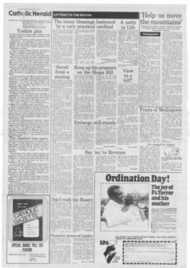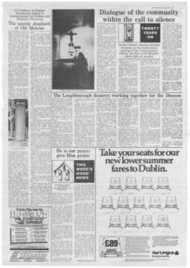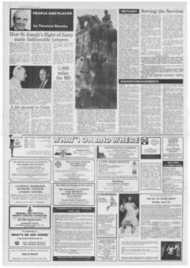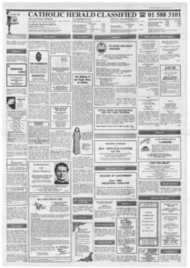Page 5, 4th April 1986
Page 5
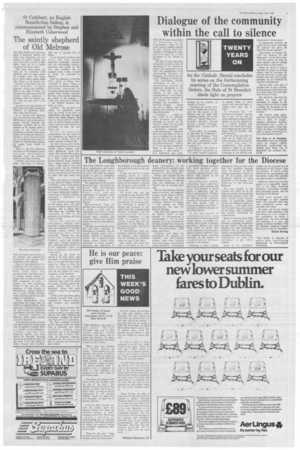
Report an error
Noticed an error on this page?If you've noticed an error in this article please click here to report it.
Tags
Share
Related articles
So Will My Parish Church Close Down?
Bishop Malcolm Mcmahon Argues That It Is Possible To Listen
A Deanery Answer To Parish Problems
A Challenge For The Next Ten Years
Hope That National Conference Of Priests Will Leave...
The Loughborough deanery: working together for the Diocese
THE FOLLOWING words talk about organisation ,and topics but behind these words there is the spirit. This spirit has helped people to grow in confidence and ability, to share, to talk, to pray and work together.
The beginning of this growth was in the end — the end of the Easter 1984 Nottingham ,Diocesan Response to the Pope's visit, and the culmination of meetings, study and prayer carried out in parishes throughout the Diocese.
Representatives from the parishes were invited last Easter to spend a week end at Nottingham University to share with others from throughout the Diocese their thoughts and questions. During that weekend people met twice in their deanery groups.
For most, it was the first time they had been conscious of belonging to a deanery. By the second meeting there was a distinct feeling of community within the Loughborough Deanery group. People found enjoyment in being together, discussing their experiences of the Response, both practical and spiritual, and looked at the way ahead.
A date was set for a future meeting, firstly to receive feedback from representatives they delegated to meet with the priests of the deanery to discuss the Response, and secondly to decide where they wanted to go as a group.
The group met, and has continued to meet, October 1985 marks the seventh meeting and all parishes have now participated. As the group grew and developed it needed an identity and structure. It first called itself the Loughborough Deanery Committee, then the Loughborough Deanery Pastoral Committee — and finally, in accordance with the Vatican Council and with the agreement of the Bishop, the Loughborough Deanery Pastoral Council.
A chairperson and coordinator, both lay members of the Deanery, were appointed and the meetings are convened under the aegis of the Dean.
Most readers will realise that what is described so far is a major development in the structural life of a deanery. Such development has taken place because of a variety of factors.
People came together for the Response because they wanted and needed to meet, to find out what was happening in the Church and to examine their role.
But this development, and the speed of progress, has happened because certain deanery priests, notably the Dean and the Deanery Priests' Response Coordinator, wanted it to happen — and because the whole development has had the Bishop's blessing.
And what does happen when the deanery meets? A huge amount of information is interchanged — fed in from parishes as to the multifarious activities such as fund raising for the third world, rosary meetings with non-conformists, bible study, and so on.
Concerns, and ideas, are introduced by teachers in Catholic and non-Catholic schools, from those involved with youth groups, and from the young themselves. Information is percolated through members who have attended other meetings — of altar servers, catechists, special ministers and various work parties in the deanery and diocese.
Questions are posed, countered, and sometimes answered, by laity, religious and clergy. The presence of parish priests is important, and the Dean is always present. Whether the topic is the litany or Carod, the spiritual or the practical, members of the deanery want to hear their priests, want to exchange thoughts with them — and want to feel they are part of the living Church.
To aid this process of communication, and particularly to involve those who cannot always, or indeed ever attend, there is now a Deanery newsletter. Efforts are also being made to ensure each parish appoints a representative (parish pastoral councils?) who will regularly attend, providing continuity in the process of communication between parishes in the deanery.
Following a recent training programme there are now some sixty new catechists scattered across the deanery, an RCIA training programme is about to get off the ground, and new discussion material is being circulated in the parishes as a follow-up to the Diocesan Response.
The next meeting of the Council will touch on all the topics previously mentioned and additionally deanery music, the newly formed Youth Council, prayer for specifically named clerical and religious students of the deanery — and finally there will be small discussion groups on the liturgy, and a delightful item entitled "Animating the Congregation".
Much of what has been Igted tells of community parish activities, of groups, of activities for the "joiner". But for some parishes, for some individuals, joining is not an option. The reasons are manifold but lack of confidence is often a key factor, confidence to join and confidence to get others together.
Some of the confidence
needed can be provided by the institution of the Church. Thus the presence of parish priests talking of lay participation and innovation within their parishes can open minds to possibilities.
Other key factors are the easy access to a responsible figure, that is the Dean answering questions, stimulating thought and provoking action, and the' blessing of the Bishop.
And once people are encouraged to meet together under this umbrella then their own confidence grows and cascades onto other.
So when one of our earliest and more timid members, who had drawn on every vestige of her confidence to return a second time, was seen rescuing and drawing in a new, and equally sensitive member, I felt the Deanery Pastoral Council had earnt its title for that alone.
Marie Strong
*The writer is lecturer in adult and continuing education at Nottingham University.
blog comments powered by Disqus





